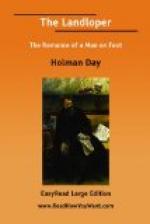“I never saw that fellow before, but I’ll pinch him if you say so, Colonel Dodd,” volunteered the policeman. “Do you make complaint?”
“No,” snapped the colonel, glowering on the broad back which was swinging across the square in retreat. He told his chauffeur to drive on.
When the car passed Farr the colonel flicked cigar ashes which alighted in a spray of dust on the sleeve of the frock-coat.
“Bah!” said the colonel, shooting the young man a scowl.
Farr gave in return a smile, but it was not a particularly genial smile.
The young man went on his way leisurely; by his gait, by his frequent and somewhat prolonged pauses at shop windows, by his indifferent starings at traffic and pedestrians, it was plain that he had little of moment on his mind.
He bought a penny glass of water at a corner kiosk.
“Do you mind telling me,” he asked the vender, “Who is Colonel Dodd of this city? I am a stranger and I have just overheard the name.”
The man grinned. “If it wasn’t for Colonel Symonds Dodd I wouldn’t be making much of a living here, selling spring-water. He is president of the Consolidated.”
“And that means?”
“Why, it means that he is boss of the water trust that owns the system in this city and in all the other cities and towns of this state. And they pump all of their water out of the rivers because the lakes are so far off, and nobody drinks that water unless he has to or don’t know any better. Colonel Dodd? Why, he bosses the whole state, they tell me.”
“I gathered that he was important,” said the young man, and walked on.
He was held up in the passing crowd at a street corner for a few moments because a parade of some half-dozen automobiles whirled past. The cars were decorated with banners, and the wild flowers and other spoil of forest and field in the arms of the ladies indicated that this was a party returning from a picnic in the suburbs.
“Would you mind telling me,” asked Farr of the policeman who was guarding the corner, “who that young man is—the one there in the gray automobile?”
“With the bleached blonde and the pretty girl?” asked the officer. “Oh, that’s Colonel Dodd’s nephew—Dicky Dodd. Of course you know who the colonel is.”
“Yes,” said Farr. He opened his mouth to ask another question, for the policeman seemed to be of the obliging sort. Then he closed his lips resolutely and marched along.
“What’s the use?” he muttered. “Two dark eyes and a red mouth—and I am almost forgetting how to be a philosopher.”
Farther down the city thoroughfare he met one who had claimed to be a philosopher. It was Jared Chick, stalking along the sidewalk in his home-made armor. He held a box of stove-polish in one hand and a brush in the other, and as he strolled he was giving his corselet and such parts of the armor as he could handily reach a glossy coat—a gleaming and burnished surface. On his helmet in place of a crest Knight Chick bore aloft a metal banneret inscribed, “Invincible Stove Polish.”




